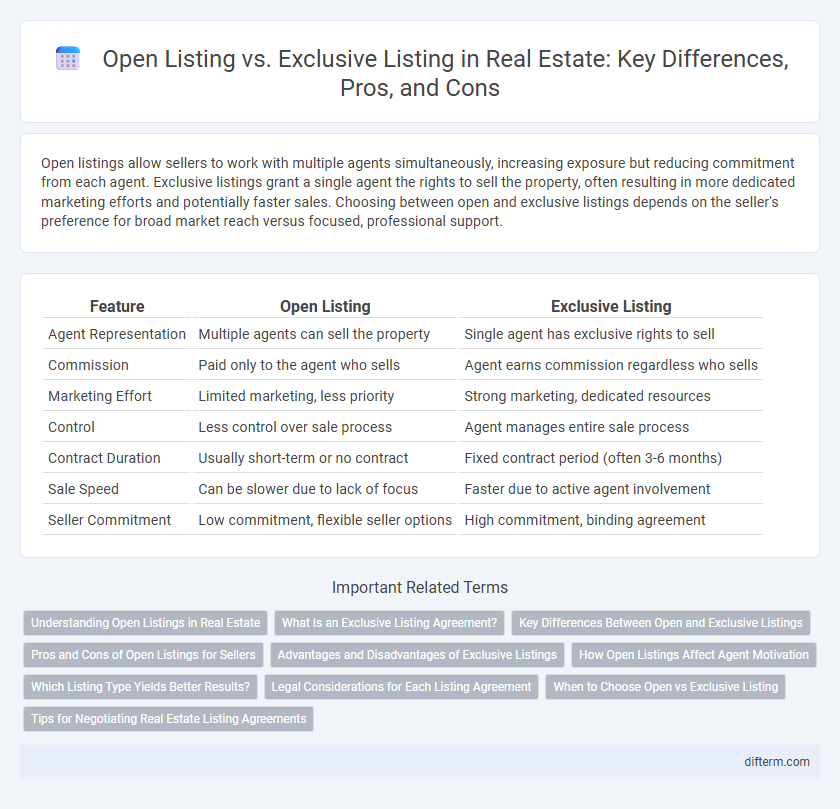Open listings allow sellers to work with multiple agents simultaneously, increasing exposure but reducing commitment from each agent. Exclusive listings grant a single agent the rights to sell the property, often resulting in more dedicated marketing efforts and potentially faster sales. Choosing between open and exclusive listings depends on the seller's preference for broad market reach versus focused, professional support.
Table of Comparison
| Feature | Open Listing | Exclusive Listing |
|---|---|---|
| Agent Representation | Multiple agents can sell the property | Single agent has exclusive rights to sell |
| Commission | Paid only to the agent who sells | Agent earns commission regardless who sells |
| Marketing Effort | Limited marketing, less priority | Strong marketing, dedicated resources |
| Control | Less control over sale process | Agent manages entire sale process |
| Contract Duration | Usually short-term or no contract | Fixed contract period (often 3-6 months) |
| Sale Speed | Can be slower due to lack of focus | Faster due to active agent involvement |
| Seller Commitment | Low commitment, flexible seller options | High commitment, binding agreement |
Understanding Open Listings in Real Estate
Open listings in real estate allow multiple agents to market a property simultaneously, with the seller only paying a commission to the agent who successfully closes the sale. This non-exclusive arrangement offers flexibility but may result in less motivated agents compared to exclusive listings that grant sole representation. Understanding the benefits and limitations of open listings helps sellers make informed decisions about how to best market their property.
What Is an Exclusive Listing Agreement?
An exclusive listing agreement grants one real estate agent the sole right to market and sell a property, ensuring dedicated representation and focused marketing efforts. This contract typically includes a fixed term during which the seller cannot list the property with other agents, increasing the agent's motivation to secure a sale. Exclusive listings often lead to more coordinated showings and stronger negotiation power, benefiting both sellers and buyers in the transaction process.
Key Differences Between Open and Exclusive Listings
Open listings allow multiple real estate agents to market a property, with only the selling agent receiving a commission, offering flexibility but less control. Exclusive listings grant a single agent the right to sell the property, often resulting in dedicated marketing efforts and a higher likelihood of a successful sale. The choice impacts agent motivation, commission structure, and overall marketing strategy in property transactions.
Pros and Cons of Open Listings for Sellers
Open listings offer sellers flexibility by allowing them to work with multiple real estate agents simultaneously, increasing the chances of a quicker sale without paying exclusive commission fees. However, the lack of agent commitment often leads to limited marketing efforts and less motivation to prioritize the property, potentially resulting in a longer time on market. Sellers may face challenges in tracking multiple agents and managing conflicting showings, which can complicate the selling process.
Advantages and Disadvantages of Exclusive Listings
Exclusive listings provide sellers with dedicated representation and increased marketing efforts, often resulting in faster sales and potentially higher offers. However, they limit the seller's ability to work with multiple agents, which can reduce exposure to a broader pool of buyers. Commission fees are typically higher in exclusive listings, increasing overall costs for the seller.
How Open Listings Affect Agent Motivation
Open listings often decrease agent motivation because multiple agents compete for the same sale without guaranteed commission, reducing the incentive to invest time and resources. Exclusive listings foster stronger agent commitment by ensuring sole representation, which encourages dedicated marketing efforts and personalized client service. Agents typically prioritize exclusive listings due to higher probability of closing deals and securing compensation.
Which Listing Type Yields Better Results?
Exclusive listings typically yield better results due to motivated agent representation and concentrated marketing efforts, which increase property visibility and attract serious buyers. Open listings, while offering broader agent exposure, often lack dedicated commitment, leading to slower sales and less coordinated promotion. Data shows that properties under exclusive listings sell faster and closer to the asking price compared to open listings.
Legal Considerations for Each Listing Agreement
Open listings allow multiple brokers to market a property simultaneously, but only the broker who procures the buyer earns a commission, which can complicate legal clarity on broker responsibilities and ownership rights. Exclusive listings grant one broker sole selling rights, establishing clear contractual obligations, defined commission terms, and reducing disputes over agency disclosure and fiduciary duties. Legal considerations require careful review of termination clauses, exclusivity periods, and state-specific regulations to ensure compliance and protect both seller and broker interests.
When to Choose Open vs Exclusive Listing
Choosing an open listing suits sellers seeking maximum exposure without commitment, allowing multiple agents to market the property simultaneously. Exclusive listings are ideal for sellers wanting dedicated agent attention, streamlined communication, and often a higher level of service. Evaluate market conditions, property uniqueness, and the need for agent motivation to decide between open and exclusive listings.
Tips for Negotiating Real Estate Listing Agreements
When negotiating real estate listing agreements, clearly define the commission structure to avoid future disputes between open and exclusive listings. Emphasize the importance of setting a realistic listing price based on comparative market analysis to attract qualified buyers quickly. Ensure all terms, including duration and cancellation clauses, are explicitly outlined to protect both seller and agent interests.
open listing vs exclusive listing Infographic

 difterm.com
difterm.com